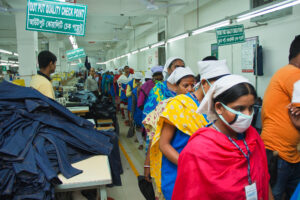Backsliding Toward Disaster?
The Power of Factory Owners over the RMG Sustainability Council Is Putting Workers’ Lives at Risk
February 10, 2025
Clean Clothes Campaign, Maquila Solidarity Network, Worker Rights Consortium

photo credit: International Accord
Under the Bangladesh Accord, now the International Accord, garment factories in Bangladesh have made vast safety improvements since 2013, saving thousands of workers from injury or death. These gains are now under threat.
Essential to the Accord’s unprecedented success in advancing worker safety in the garment sector is a governance design ensuring that worker safety goals, not the short-term interests of factory owners or brands, guide its operations. Bangladeshi unions play a central role in its governance; along with global unions, they hold 50% of the voting seats. The brands are held accountable, under their binding Accord commitments, for the impact of their purchasing practices on worker safety. And factory owners do not have governance power in the program, ensuring that the program’s independent inspectorate can do its work free from employer interference. The Accord works with industry but is not beholden to it.
While some factory owners embraced the Accord program and its commitment to upholding Bangladesh’s safety standards, others did not. In 2018, the Accord came under attack from recalcitrant owners supported by the Sheikh Hasina government. With the government threatening to shut down the program, the international brand and union signatories on the Accord’s Steering Committee agreed in 2019 to a handover of the Accord’s day-to-day Bangladesh operations to a new entity, the Ready-Made-Garment Sustainability Council (“RMG Sustainability Council” or “RSC”). Unlike the Accord, the RSC is governed partly by factory owners, who were appointed by leaders of the Bangladesh Garment Manufacturers and Exporters Association (BGMEA) (and, in one case, by the BGMEA’s knitwear counterpart, the BKMEA). Worker organizations hold only one third of the governance power. (The Accord maintained its international operation, under the pre-existing governance structure, and it now provides support for safety programs in both Bangladesh and Pakistan.)
As documented in this memorandum, the partial control of the RSC by factory owners is weakening its effectiveness. The Accord’s primary mechanism for holding factory owners accountable when they subject workers to deadly hazards operates with less rigor and less speed. A crucial boiler safety program suffered endless delays. This is reducing the margin of safety for the nation’s garment workers and putting lives at risk.
It is time for the development of a new governance structure at the RSC that respects the process of reform in the country. Restructured governance can restore the RSC’s independence and allow it to do its job unimpeded: protecting the safety of garment workers and supporting the efforts of current and future governments in Bangladesh to strengthen the nation’s regulatory institutions.
